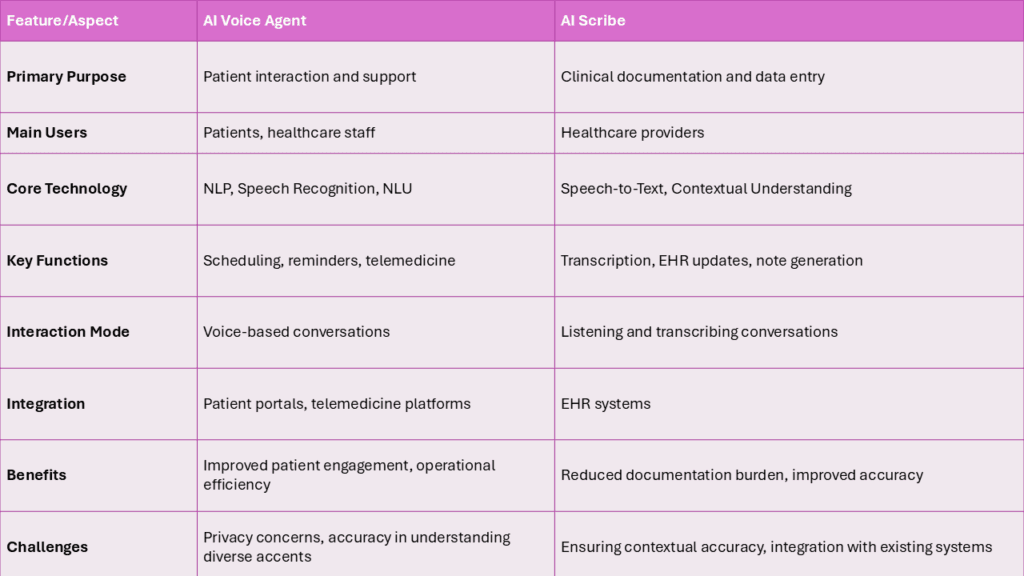AI Voice Agents and AI Scribes are both AI-powered tools used in the healthcare industry, but they serve different purposes and have distinct functionalities. Here’s a detailed comparison of the two:
AI Voice Agent
An AI Voice Agent is a conversational AI system that interacts with users through voice commands and responses. It uses natural language processing (NLP) and speech recognition to understand and respond to spoken language.
Primary Functions of AI Voice Agent:
- Patient Interaction:
- Scheduling appointments
- Providing medication reminders
- Answering patient queries
- Symptom checking and triage
- Administrative Tasks:
- Handling billing and insurance inquiries
- Assisting with patient intake processes
- Telemedicine:
- Facilitating virtual consultations
- Remote patient monitoring
- Accessibility:
- Assisting patients with disabilities
- Providing voice-based navigation for healthcare services
Key Features of AI Voice Agents:
- Voice Recognition: Converts spoken language into text.
- Natural Language Understanding (NLU): Interprets the meaning behind the words.
- Response Generation: Provides appropriate verbal responses or actions based on the input.
Use Cases:
- Patient Support: 24/7 patient assistance and engagement.
- Operational Efficiency: Automating routine administrative tasks.
- Telehealth: Enhancing remote care delivery.
AI Scribe
An AI Scribe is a specialized AI tool designed to assist healthcare providers by automating the documentation process. It listens to doctor-patient conversations and transcribes them into structured clinical notes.
Primary Functions of AI Scribe:
- Clinical Documentation:
- Real-time transcription of patient encounters
- Updating Electronic Health Records (EHR)
- Generating clinical notes and summaries
- Data Entry:
- Automating the entry of patient data into EHR systems
- Reducing manual documentation workload
- Compliance:
- Ensuring accurate and compliant medical records
- Reducing documentation errors
Key Features:
- Speech-to-Text: Converts spoken language into written text.
- Contextual Understanding: Recognizes medical terminology and context.
- Integration: Seamlessly integrates with EHR systems.
Use Cases of AI Scribe:
- Clinical Efficiency: Reducing the time spent on documentation.
- Accuracy: Improving the accuracy of medical records.
- Provider Satisfaction: Allowing healthcare providers to focus more on patient care.

Conclusion
While both AI Voice Agents and AI Scribes leverage AI to improve healthcare delivery, they cater to different needs within the medical field.
AI Voice Agents focus on enhancing patient interaction and automating administrative tasks, whereas AI Scribes aim to streamline clinical documentation and reduce the documentation burden on healthcare providers.
Together, these technologies can significantly enhance the efficiency, accuracy, and overall quality of healthcare services.
